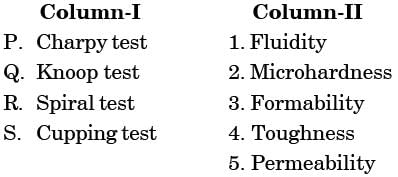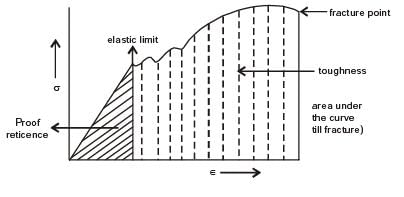Mechanical Engineering Exam > Mechanical Engineering Notes > Engineering Materials > GATE Past Year Questions: Mechanical properties of metals
GATE Past Year Questions: Mechanical properties of metals | Engineering Materials - Mechanical Engineering PDF Download
Question for GATE Past Year Questions: Mechanical properties of metals
Try yourself:Hardenability of steel is a measure of
[ME 2019,Set-2]
View Solution
Question for GATE Past Year Questions: Mechanical properties of metals
Try yourself:The "Jominy test" is used to find
[ME 2016, Set-1]
View Solution
Question for GATE Past Year Questions: Mechanical properties of metals
Try yourself:For a ductile material, toughness is a measure of
[ME 2013]
View Solution
Question for GATE Past Year Questions: Mechanical properties of metals
Try yourself:The ultimate tensile strength of a material is 400 MPa and the elongation up to maximum load is 35%. If the material obeys power law of hardening, then the true stress-true strain relation (stress in MPa) in the plastic deformation range is
[ME 2006]
View Solution
Question for GATE Past Year Questions: Mechanical properties of metals
Try yourself:When the temperature of a solid metal increases,
[ME 2005]
View Solution
Question for GATE Past Year Questions: Mechanical properties of metals
Try yourself:Hardness of steel greatly improves with
[ME 2003]
View Solution
Question for GATE Past Year Questions: Mechanical properties of metals
Try yourself:Match the items in columns I and II.

[ME 2006]
View Solution
The document GATE Past Year Questions: Mechanical properties of metals | Engineering Materials - Mechanical Engineering is a part of the Mechanical Engineering Course Engineering Materials.
All you need of Mechanical Engineering at this link: Mechanical Engineering
|
15 videos|19 docs|13 tests
|
FAQs on GATE Past Year Questions: Mechanical properties of metals - Engineering Materials - Mechanical Engineering
| 1. What are the mechanical properties of metals? |  |
Ans. The mechanical properties of metals refer to their response to applied forces or loads. These properties include strength, hardness, ductility, toughness, and elasticity. Strength measures the ability of a metal to withstand an applied load without deformation or failure. Hardness refers to a metal's resistance to indentation or scratching. Ductility is the ability of a metal to be stretched or drawn into a wire without breaking. Toughness measures a metal's ability to absorb energy without fracturing. Elasticity is the property of a metal to regain its original shape after being deformed.
| 2. How are mechanical properties of metals measured? |  |
Ans. Mechanical properties of metals are measured using various testing techniques. Tensile testing is commonly used to determine a metal's strength, ductility, and elasticity. In this test, a sample is subjected to an increasing tensile load until it breaks, and the stress-strain curve is plotted. Hardness testing involves measuring a metal's resistance to indentation using methods like Brinell, Rockwell, or Vickers hardness tests. Impact testing is used to evaluate a metal's toughness by measuring its ability to resist fracture under high-velocity impact. Other tests, such as compression testing and fatigue testing, can also be performed to assess different mechanical properties.
| 3. What factors affect the mechanical properties of metals? |  |
Ans. Several factors influence the mechanical properties of metals. The composition of the metal, including the types and amounts of alloying elements, greatly affects its properties. Heat treatment processes like annealing, quenching, and tempering can alter the mechanical properties by changing the microstructure of the metal. The presence of impurities, defects, or grain boundaries can also impact the properties. Additionally, factors such as temperature, strain rate, and loading conditions can influence a metal's mechanical behavior. Understanding these factors is crucial for designing and selecting materials with desired mechanical properties.
| 4. Why are mechanical properties important in engineering? |  |
Ans. Mechanical properties play a vital role in engineering as they determine the suitability and performance of materials in various applications. Engineers need to consider the mechanical properties when designing structures, machines, or components to ensure they can withstand the expected loads and operate safely. For example, high strength is essential for load-bearing structures, while ductility is crucial for materials used in forming processes. Understanding the mechanical properties also helps in material selection, failure analysis, and predicting the behavior of materials under different conditions, leading to efficient and reliable engineering designs.
| 5. How can mechanical properties be improved in metals? |  |
Ans. Mechanical properties of metals can be improved through various methods. Alloying is a common technique where small amounts of other elements are added to the base metal to enhance specific properties. Heat treatment processes like quenching and tempering can alter the microstructure and improve strength, hardness, and toughness. Cold working or deformation can increase the hardness and strength of metals, but excessive deformation can reduce ductility. Surface treatments like carburizing, nitriding, or plating can improve wear resistance and hardness. Additionally, controlling the grain size, removing impurities, and optimizing the manufacturing processes can also lead to improved mechanical properties in metals.

|
Explore Courses for Mechanical Engineering exam
|

|
Signup for Free!
Signup to see your scores go up within 7 days! Learn & Practice with 1000+ FREE Notes, Videos & Tests.
Related Searches



















